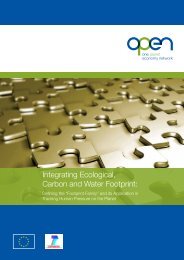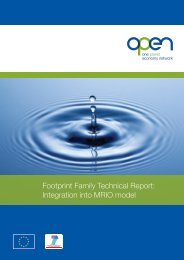OPEN: EU Scenario Storylines Report: - One Planet Economy Network
OPEN: EU Scenario Storylines Report: - One Planet Economy Network
OPEN: EU Scenario Storylines Report: - One Planet Economy Network
You also want an ePaper? Increase the reach of your titles
YUMPU automatically turns print PDFs into web optimized ePapers that Google loves.
<strong>Scenario</strong> 4 – Slow Motion<br />
DRIVERS:<br />
Quality-driven mindset towards development & technological stagnation<br />
ASSUMPTIONS:<br />
The following assumptions about society help to form a picture of what life would be like<br />
for Europeans in 2050. These assumptions also inform the consideration of the policy<br />
measures needed in this <strong>Scenario</strong> to reach the <strong>One</strong> <strong>Planet</strong> <strong>Economy</strong> goal:<br />
� Quality of life is prized over economic growth and increasing income.<br />
� Prices act as a strong driver towards resource efficiency and sufficiency.<br />
� Values have become less materialistic. Companies and consumers are driven by a<br />
quality and community development-orientation instead of profit maximisation.<br />
� Technological innovation in the efficiency of resource and energy use and in the<br />
development of alternative energy sources is limited.<br />
� Due to the stagnation in technological innovation and changing societal<br />
expectations, collaboration and knowledge sharing have become more important<br />
forces than competition in the business world.<br />
� Social innovation 13 is highly dynamic and proves successful in increasing human<br />
capabilities, welfare and environmental sustainability.<br />
LIFE IN <strong>EU</strong>ROPE IN 2050<br />
Most Europeans have embraced frugality, simplicity and sustainability as key<br />
elements of their lifestyle. Most Europeans live in cities in socially innovative modes of<br />
housing such as co-housing communities, urban co-ops and communes. Urban sprawl<br />
has thus declined. Some self sufficient communities have moved back to the countryside,<br />
and many people have developed the green areas of the cities for cultivation. In general,<br />
social status across society is gained from immaterial goods such as education, culture<br />
and social networks. The education system takes holistic approach to learning, in which<br />
self-awareness, environmental awareness, spiritual and community values play a key<br />
part.<br />
The <strong>EU</strong>’s economy is reflective of its values and has become famous for its<br />
Beyond GDP approach, which is also being promoted in the rest of the world. When<br />
people do make purchases, prices for goods and services are comparatively higher than<br />
40 years ago, as they now reflect the true costs of social and environmental externalities.<br />
Most people prefer to share or lease many durable goods that were previously<br />
individually owned. Further, roughly half of Europe‘s population shuns consumerism<br />
altogether and adopted the more extreme lifestyle of voluntary simplicity—LOVOS.<br />
These large groups form strong local communities and are often completely selfsufficient.<br />
Due to the large segment of LOVOS, energy and resource use has declined<br />
dramatically over the past 40 years despite lagging technological advancements.<br />
13 A social innovation is a novel solution to a social problem that is more effective, efficient, sustainable, or just<br />
than existing solutions and for which the value created accrues primarily to society as a whole rather than<br />
private individuals (Phills, et al., 2008, p. 36).<br />
Page 39 of 57





